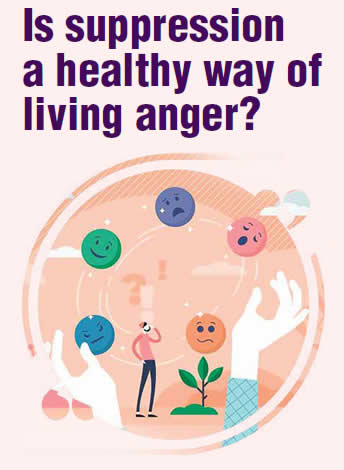Suppression is a defense mechanism in which the person avoids intentionally thinking about disturbing problems, desires, feelings, or experiences. It is considered as a mature form of defense mechanism, since these attempts to cope up with the situation are more conscious. But, is this a healthy way of living anger?
Studies suggest that suppression has some psychosomatic impacts. “Acute effects of emotion suppression might translate into longer term threats to cardiovascular health” (Mauss & Gross, 2004, p.74). “Extreme suppression of anger was the most commonly identified characteristic of 160 breast cancer patients who were given a detailed psychological interview and selfadministered questionnaire” (Shlackman, 2009, p. 3). Again suppression negatively affects the treatment of the cancer also “There is evidence to show that suppressed anger can be a precursor to the development of cancer, and also a factor in its progression after diagnosis” (Shlackman, 2009, p. 4).
Another study says that teenagers high in anger suppression reported consuming alcohol more frequently, and being less physically active than their peers (Musante & Treiber, 2000, P. 63). Martin Kantor (2002) says suppressed anger can predispose to skin diseases (p.8). Individuals who typically suppress reported more depressive symptoms, felt less satisfied with life, had lower self-esteem, and were less optimistic (Gross & John, 2003, p.359). If anger isn’t allowed outward expression, it can turn inward; and may cause hypertension, high blood pressure, or depression (American Psychological Association, 2022, para. 7).
Srivastava, McGonigal, Tamir, John and Gross (2009) studied about the social costs of suppression and they say that “suppression had a negative impact on the close relationship” (p.892). According to them suppression primarily blocks “the important social processes rely on others knowing about individual’s emotional state” (p.895). A second probability is that “the individuals who attempt to suppress their expressive behaviour are partially successful. If social partners correctly infer that an individual is suppressing they may perceive a suppressor is being uninterested in intimacy” (p.895). Third probability is that “individuals who are preoccupied with regulating their emotions might have difficulty fully engaging and responding to others in social interaction” (p.895). Those who suppress also reported substantially discomfort with closeness and sharing in close relationships (Gross and John, 2003, p. 358). “More frequent use of suppression in daily life is associated with avoidant attachment, reduced sharing of emotions, lower social support, lower peer-rated likeability, and reduced relationship closeness” (Butler, Lee and Gross, 2007, p.31).
Suppression can prevent one from expressing one’s anger consciously, but such conscious efforts can cost the person in various manners, especially with psycho-somatic effects and also in social relationships. There are healthier mode of living anger.


